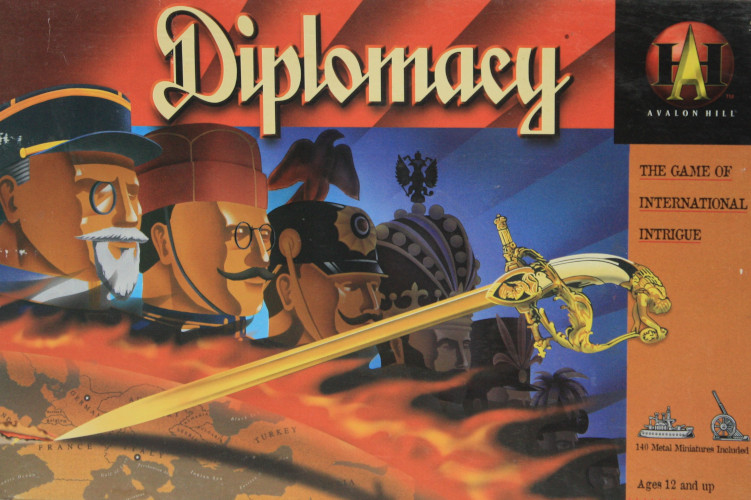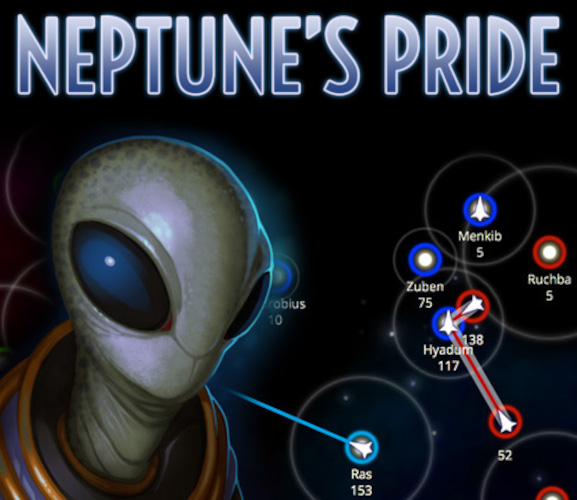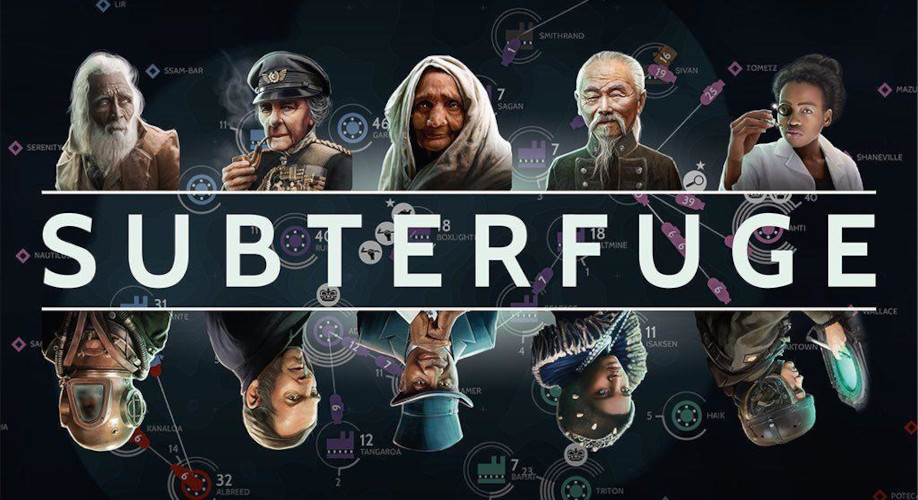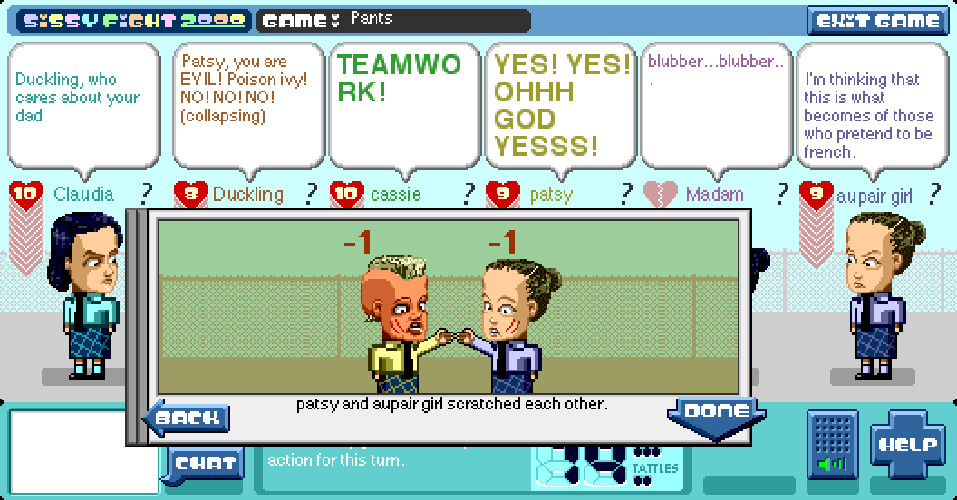Reforging the Crown: Design Synthesis in Regicide
The Ludum Dare 50 game jam was this month, and I took the opportunity to motivate myself to create a new game. Regicide is an online turn-based strategy game of courtly intrigue and deception for 5-10 players. You can play with friends, or with anyone available by joining a public game.
The theme for the LD50 jam was "delay the inevitable." Whenever possible, I prefer to awkwardly shoehorn an existing idea from my game concept backlog into a jam theme. LD50 afforded me an opportunity to finally motivate myself to implement my ideas for Regicide, which I've had in the back of my mind for years.
In Regicide, players take on shifting roles as the game progresses. One player is the Monarch, whose goal is to avoid being dethroned. The other players are Courtiers, who are scheming to seize the throne for themselves by any means necessary. The general idea of trying to cling desperately to power and avoid being deposed in an environment where deception and conspiracy lurk around every corner seemed like a good fit for the theme. Overall, I'm quite pleased with how the project turned out!
Some game ideas come from pure innovation. Other concepts emerge from exploring a theme that has deep personal meaning. Still others result from taking inspiration from an existing genre or set of references, and attempting to synthesize those influences and refine them into a coherent package. Regicide falls into this last category.
When I teach introductory game design, one of the earliest design exercises I start with is to have students name a game they play and list out some things they like and dislike about it. From there, we have a group discussion where we think critically about the game or genre, and try to generate ideas for how it could be improved (or adjusted to fit different audiences and contexts).
The term "design synthesis" is really just a fancy way of describing a similar technique. But instead of stealing ideas from just one game, this time we will brazenly borrow the best bits from multiple sources at once. When performing this type of design synthesis, the analytical process is spread out across multiple reference points and includes an extra step of trying to identify trends and compatible elements across these sources of inspiration.
I thought it might be interesting to document how this process worked for Regicide. The design concept draws inspiration from three board games, three digital games, and even a song or two. Let's take a look at them!

Diplomacy
Diplomacy is the classic game of international intrigue that created the template and set the standard for the "negotiation game" genre.
Aspects I like:
- Simple combat model that places the emphasis on making and breaking alliances
- Dynamics have an inherent tension of requiring players to balance teamwork and self-interest
- Simultaneous action selection reduces downtime and lends itself to non-physical versions (play by mail and online adaptations)
Aspects I dislike:
- Difficult to get an adequate number of players together in the same place (especially these days)
- Time-consuming to play
- Digital versions have a bad track record, with a number of negatively received adaptations
I wanted to make a game that offers the same pleasures as Diplomacy, and places a similar emphasis on negotiation and strategic alliances. However, I also wanted it to be quicker and easier to play. Ideally, I wanted the game I made to be playable in a single session rather than taking hours or weeks to complete.

Lifeboats
Lifeboats is a game of democracy in its most brutal form, as players decide who to jettison for the greater good while paddling their leaky lifeboats toward safety. The game features a compelling voting-based progression dynamic, where your survival depends on influencing the group votes in your favor via public discussion and strategic positioning.
Aspects I like:
- Pawn movement is simple to understand, while still providing a sense of tension between mitigating risk and increasing voting power
- Limited number of "Captain's Hat" cards turns the veto ability into an even more precious resource
- Straightforward and relatively quick to play in comparison to other games in the genre
Aspects I dislike:
- Lack of support for private negotiation eliminates the covert alliance element that is integral to most other diplomacy-focused games
- Minimal variation in roles and player status makes the game slightly monotonous at times
- The element of player elimination can lead to potential downtime for some players
- Tallying up the points to determine the winner at the end feels a bit anticlimactic
I wanted to make a game that has a similar level of simplicity in its mechanics, but also allows for hidden information and covert communication to enable players to form secret alliances.

King of Tokyo
King of Tokyo is a wild brawl for supremacy between giant monsters duking it out for control of the city. Only one player can occupy the city at a time, and whenever you're in the hot seat you become the focal point for attacks by the other players as they attempt to oust you and make room for a new boss in town.
Aspects I like:
- King of the Hill format is simple to understand and provides a focal point for players that helps to streamline the experience
- Dynamic roles with different abilities create shifting power dynamics and reinforce the sensation of struggling to cling to power
- Entertaining choice of theme that is also well suited to the game mechanics
Aspects I dislike:
- Strong emphasis on chance-based mechanics and "pushing your luck" elements adds a bit more of a gambling flavor
- Many of the strategic decisions are made in isolation, with no real support for player negotiation designed into the game dynamic
- Player elimination mechanic creates the possibility of downtime
I wanted to make a game that combines the fun, clarity, and shifting fortunes of a "king of the hill" structure with the diplomacy and strategic alliances of a more negotiation-focused experience.

Neptune's Pride
Neptune's Pride is a multiplayer game of galactic conquest where players compete to be the first one to claim a certain amount of territory. Territorial expansion is heavily dependent upon building alliances, but ultimately there can only be one winner!
Aspects I like:
- Combat balance is well tuned to favor defensive play and require players to form alliances in order to progress
- Pared down 4x genre mechanics keep the player's attention focused on negotiation and diplomacy
- Convenient asynchronous structure attempts to make it easier to play the game around your own schedule
Aspects I dislike:
- Real-time game progression heavily incentivizes timing sneak attacks when other players are asleep
- Tense atmosphere of paranoia and hypervigilance combined with lengthy game duration leads to frayed nerves and emotional exhaustion
- Defense-oriented combat balancing leads to increased likelihood of stalemate and attrition as the number of viable players is reduced
In some ways, Neptune's Pride is almost too effective at instilling strong feelings of dread and mistrust among players. A common refrain among lapsed NP players is that it's one of the greatest games that they would never play again. Attempts by the designers to mitigate the sleep deprivation issue by grafting a turn-based structure onto the mechanics never really felt organic or effective.
I wanted to make a game that provides a similarly convenient digital interface as NP, but without the sensation of needing to check in compulsively over multiple weeks to avoid losing valuable response time. I wanted to make a game that featured the same emphasis on negotiation and alliances, but without the sleepless nights and emotional weariness that I experienced during my NP play sessions.

Subterfuge
Subterfuge is a game of strategy and diplomacy that adapts the Neptune's Pride formula to mobile platforms. Like NP, the game plays out slowly in real-time over the course of a week or longer. Incidentally, it also has a fabulous trailer.
Aspects I like:
- Highly polished presentation, with various UI enhancements that attempt to mitigate the problems associated with the real-time gameplay
- Mobile platform is a good fit for the chatty style and gradual pacing of a negotiation game
Aspects I dislike:
- Additional mechanical complexity added to the combat and other systems, rather than simplifying the Neptune's Pride template
- Lengthy game duration can increase the likelihood of players feeling genuinely upset and embittered in response to betrayals
I wanted to make a negotiation game that could be played on mobile devices like Subterfuge, but that would take place over a shorter period of time and have overall lower emotional stakes. I also wanted the inevitable player betrayals to feel lighthearted rather than inciting frustration; encouraging play session brevity seemed like a viable method of achieving that.

SiSSYFiGHT 2000
SiSSYFiGHT 2000 is an online turn-based strategy game in which players enact a social conflict between girls on a playground, attempting to reduce the self-esteem of the other girls and be one of the two survivors. As with other negotiation and diplomacy focused games, success is highly dependent on coordinating your actions with those of other players.
Aspects I like:
- Distinctive setting and presentation that embraces a lighthearted tone, combined with character customization that encourages roleplaying
- Simple set of actions that still enables player negotiation, with just enough strategic depth to provide variety
- Quick play sessions
Aspects I dislike:
- All player chat is public, with no affordances for initiating private negotiations and secret alliances
- "Last girl(s) standing" structure can lead to significant downtime for players who are eliminated early
There's a lot to admire about SiSSYFiGHT 2000. I set out with the goal of creating a game that had a similarly brisk pace and elegant design, with a streamlined set of choices that would nevertheless be sufficient to enable strategic depth. However, as much as I enjoyed my time at the playground, I missed having at least some light element of strategic positioning and the option for covert discussions.
The idea of all player chat being public suits the concept and theme of SiSSYFiGHT 2000, since it encourages more of a taunting and teasing style of interaction that is pitch perfect for the playground. But for a negotiation game, I still believe that enabling secret alliances opens up a wider range of dynamic possibilities for players to explore.
Regina Spektor - Oedipus & Après Moi
Like most game designers, I have an ever-expanding backlog of game concepts that grows at a rate which drastically outpaces my ability to actually implement the ideas. But occasionally, certain design concepts get stuck in my head like a catchy song. If the same idea continues to pop into my mind over a prolonged period of time, it's usually a sign that the concept is worth prioritizing (if only to get it out of my head and clear a space for something else).
Sometimes I even come to associate a game idea with a particular piece of music, and they become intertwined in my head like some type of conceptual synaesthesia. Regicide was one such concept. It's difficult to identify exactly how this may have shaped the idea or informed my design process, but it certainly makes me wonder if any fellow game designers or creative types have similar habits.
The primary musical association that lingered in my mind for Regicide was the song Oedipus by Regina Spektor. To a lesser extent, her song Après Moi also came to be linked with the design in my head. Some of the connections between the song and the finished project are fairly overt, while others are seemingly less apparent. Have a listen and see if anything from the song resonates with you as you play the game!
Ride the Synthwave
It's one thing to identify a whole bunch of reference points, and list out what you like and dislike about them. But that is only the first step in the full process of trying to synthesize these influences into your own game concept. Are you ready for the second (and final) step?
I don't want to overwhelm you with this next nugget of magnificently insightful design wisdom, so before I share the second step you should probably sit down. If you're already seated, it might be best to lay down and also avert your gaze slightly as you absorb this next tidbit:
Keep the aspects you like, and get rid of the aspects you don't like.
Did you catch all that? I know I'm presenting you with a lot of highly complex game design knowledge here, so don't worry if you feel a bit dizzy. That's perfectly natural.
All jokes aside, the real challenge comes from not only determining which elements to keep, but from figuring out how to combine them into a coherent whole. One approach that I find helpful is to look over the various lists of what you like and dislike about each of your references, and try to identify some recurring themes and notable trends.
In the case of Regicide, some clear patterns emerged. A few examples include:
- Most existing games in the negotiation genre involve player elimination, but this leads to player downtime and can detract from the experience (particularly since these games tend to involve a larger group of players)
- Many negotiation games require a large investment of time and a substantial emotional investment in the outcome, which can cause negative feelings to run rampant when players inevitably betray each other
- Quick play sessions, simple mechanics, and convenient interfaces help keep the pace of play brisk and the interaction lighthearted, while still retaining the essential modes of interaction that make the negotiation genre so appealing
As an addendum to this second and final step in the process, it's also beneficial to identify any elements within your references that are fundamentally incompatible. For instance, balancing your game to suit a quick single-session play style may be mutually exclusive to balancing it with the intention of having the game play out over weeks or months. Although you can occasionally find a unique and clever design solution to mitigate these clashes, more often you simply need to make a choice between them and clarify which direction you want to go with your synthesized design concept.
So, to summarize the steps in our process of design synthesis:
- List the parts you want to keep and discard from each of your references
- Identify common themes across these lists
- Be mindful of any elements in these lists that are fundamentally incompatible
Regicide is by no means a flawless design, but I'm proud of how it turned out. With any luck, perhaps it will be one of the games that you draw on and refine when developing your own future design concepts.
You can play the game for free right here (and don't forget to subscribe to my itch.io account while you're at it). I hope you enjoy it! May your reign be long and prosperous.
- Jamey (@dreamlogician)
Regicide
A turn-based online game of courtly intrigue for 5-10 players
| Status | Released |
| Author | dreamlogician |
| Genre | Strategy, Card Game |
| Tags | Casual, Ludum Dare 50, Multiplayer, party-game, Turn-based |
More posts
- Regicide is now playable on phones and tablets!Apr 25, 2022
Leave a comment
Log in with itch.io to leave a comment.